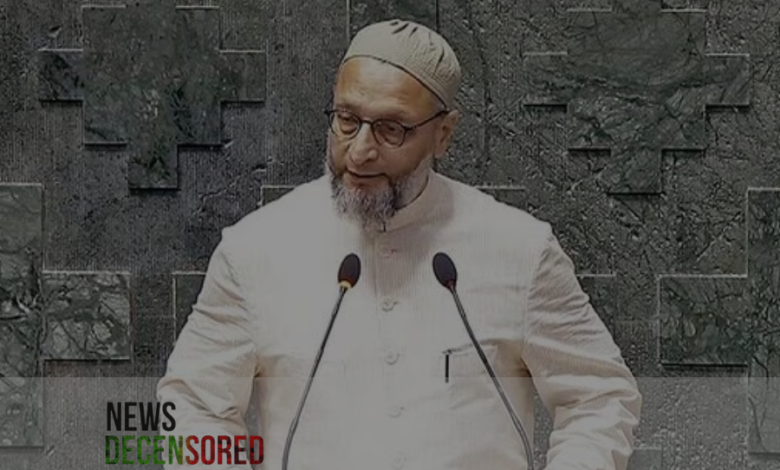Indian MP Asaduddin Owaisi Criticised for Saying ‘Jai Palestine’ While Taking Oath in Parliament

Asaduddin Owaisi, an old opposition legislator, topped up his swearing-in ceremony with a chant. This was after Owaisi had taken the pledge of office on Tuesday, the following which he shouted “Jai Palestine,” most of which Piyush Goel, the Minister of State for Railways, claimed that Owaisi swore the oppressors of India.
The word ‘jai’ in Sanskrit means ‘Victory’ but is ‘used to show support.’ Thus, with more exertion, Owaisi’s chant equally meant ‘Long Live Palestine.’
The Incident and Its Immediate Fallout
During the oath-taking ceremony, Owaisi, in a simple white dress shirt or kurta, went to the electronic scorer’s table to become one of the 543 members of the Lok Sabha, the Indian lower chamber of parliament.
He read out his pledge in Urdu: “I, Asaduddin Owaisi, the person elected as a member of Lok sabha, do swear in the name of Almighty Allah that I shall always be faithful to the constitution of India and I shall respect the supremacy and integrity of India and maintain the discharge of my duties which I shall be required to perform as a member of Lok sabha, in a loyal manner. ”
After a formal pledge, Owaisi continued, ‘Jai Bhim, Jai Meem, Jai Telangana, Jai Filisteen,’ and got off the rostrum.
The Slogans Explained
– “Jai Bhim” is an inspiring slogan dedicated to Bhimrao Ambedkar, the author of the Constitution of India and the leader of the Dalit people. The caste done by the Indian Native Dailts has been known to be very cruel and completely discriminatory.
“Jai Meem” refers to the ‘Meem’ in the Urdu alphabet, which characterizes Owaisi and the AIMIM, frequently represented by MIM.
– “Jai Telangana”: It financially remembers the Indian state of Telangana to which Owaisi belongs.
-“Jai Filisteen” is the Urdu/Hindi term for Palestine used to show solidarity with the Palestinian people.
Reactions from the Government
Asians of Hindutva origin and the ruling Australian Bharatiya Janata Party (BJP), under the leadership of Prime Minister Narendra Modi, responded sharply to Owaisi’s statement. They have alleged him guilty of betraying a foreign nation, which violated the oath of perjury to India as enshrined in the nation’s constitution. Owaisi, though, denied having entertained any such intentions with the chant, saying that his rhetoric was not an act of a traitor and that he was trying to rally support for members of the minority who are being oppressed by the dominant white sovereignty.
This preceding illuminated argument generated much debate about Owaisi’s words. Critics opine that his statement was even Lewd for the venue of a parliament while saying the oath. On the other hand, his words have been seen as courageous for voiceless groups and international justice.
Several issues arise from this event regarding the role of individual and political expression, specifically in official governmental activities. While parliamentarians debate the consequences of Owaisi’s conduct, such actions certainly bring out political and ideological cleavages in Indian politics vividly.
The inauguration ceremony, usually a relatively uneventful affair, has become one of the significant points of confrontation in modern political life. So, the “Jai Palestine” slogan has created controversies in the short run and revealed live conflict regarding which identity is more critical: national or global solidarity. With such ensuing discussions, this incident may trigger debates on how such expressions are suitable in parliaments and their effects on the politics of India.




